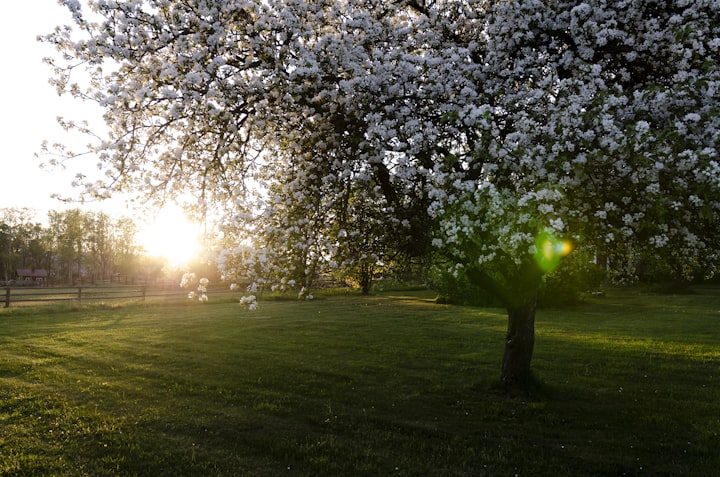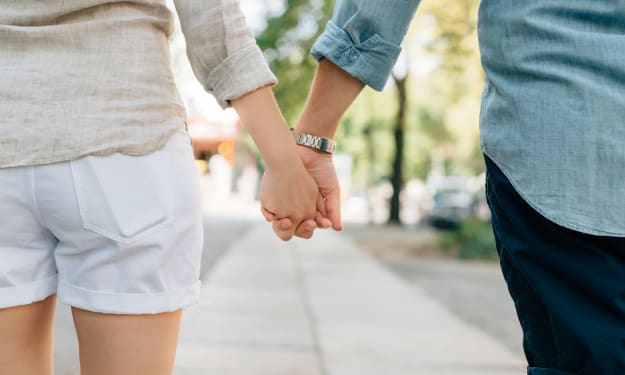A Good Woman is Hard to Hide
What's love got to do with it

1832
Something was wrong with the orchard and Lucy Coffin had a good idea why. When spring came, the trees had burst with white blossoms and she’d walked between the rows with her hands held out. Once she had even spun round and round as the wind dropped snowy petals onto her hair, her face, her eyelashes. Her skirt flared out in the cool morning light and she’d collapsed onto the grass, laughter bubbling up from deep within her.
She had been that relieved.
But she had been wrong. As Lucy stood at the bottom of the gentle hill, she couldn’t deny what the trees were telling her. Branches that should have been golden with fruit were heavy with pears red as blood.
She could still harvest them—that wasn’t the problem. Aubrey was the problem. And she had no idea how to fix him.
Lucy glided toward the tree closest to her and set down her basket. She reached up and picked the ripest pear then set it down inside. Its crimson tempted her but she didn’t dare take a bite. If Aubrey's mood was any indication of its taste, she didn’t want any part of it.
An idea struck her then, but who knew if it would work. God knows, she’d been trying to heal her husband for more than a decade. Slowly, Lucy filled her basket and when it was brimming with fruit she hefted it onto her hip and set out for Owen Flanagan’s farm.
It took her nearly an hour of fast walking to reach his gate and she was breathing hard. Her skin was slick with sweat despite the chill in the September air. If she had imagined herself the witch everyone said she was when she'd been in the orchard, she felt like Gretel from her book of fairy tales now. There was no oven it sight but she was burning up.
Owen appeared in the doorway of his cottage and waved. Lucy adjusted the basket on her hip and smiled at him. She knew she shouldn’t be foisting the pears off on him but she couldn’t think of another way to get hold of the right apples.
Anyway, what harm could it do? It had been seven years since Owen's wife died in childbirth and he’d rebuffed the efforts of nearly every eligible woman in the village. He always seemed so remarkably. . . unfazed by everything. If the pears did carry any of Aubrey’s troubles, it might be for the good. Owen could use a little excitement in his life.
Aubrey, on the other hand, most certainly could not.
Lucy pushed the gate open and started down the walk. Owen’s hair shone golden under the sun and she wondered if somehow he might be immune to strong emotions but shook off the idea. He had loved Clara to a fault and at first her death left him almost as at sea as Aubrey. There was still talk that he visited her grave when the moon was full, and almost as many townsfolk steered cleared of him as of her.
“Greetings, Mrs. Coffin.” Owen relieved her of the basket and motioned for her to follow him into the cottage. If he thought the color of the pears odd, he didn’t remark on it. “Do you have time for a spot of tea? Or. . . maybe just a cup of cool water?”
Lucy tucked a strand of hair back into her bun and tried to pretend she looked cool, if not pretty. “I’m sorry but I must be on my way, Mr. Flanagan. I was wondering if you might consider a trade? I’ve a mind to make a pie for Captain Coffin but I'm all out of apples.”

Did he hesitate a moment too long? Stupid of her, really, to hand him the pears without making her intention plain from the beginning. He must have taken them for a gift. Which she would have been happy to give, if they could have afforded it.
Or was it her use of the word captain? It was maddening, the way Lucy couldn't seem to stop referring to Aubrey by his title when he hadn’t been to sea in 11 years. It made Aubrey irritable, she knew, and in town it only reminded people of the rumors.
But when Owen ducked through the doorway and set the basket onto the kitchen table, his voice was hearty. “I’ve got Macintosh. Cortland—whichever you please.”
His daughter Elizabeth sat facing her. Her face was so pale it was nearly translucent and her braided hair gleamed as darkly as raven’s wings. She’d been named after her mother but no one ever called her Beth.
The girl didn’t smile or offer any greeting when she saw Lucy. Instead she said, “Papa, we’ll be late if we don’t leave this very minute.”
As if to drive the point home, the sound of the school bell rang out in the distance. Lucy’s eyes adjusted to the interior and settled on a bin of green apples in the corner. They were the exact same color as new spring leaves and hope surged within her.
She pointed toward them, “Those will do nicely,” she said. “I’m only in need of enough to carry in my apron. I won’t keep you.”
He looked as if he were on the verge of speaking. Green apples were surely an odd choice for a pie.
Elizabeth rose from her place at the table, bookbag slung over her shoulder. She tugged at his sleeve and it struck Lucy that it was the first childish gesture she’d ever seen the seven-year-old use. When she reached the door, the girl stepped over the sill and into the rich autumn day. The sun washed her out, so much so that she seemed more wraith than human girl.
“Goodbye, Mrs. Coffin,” she said politely.
“Goodbye, Elizabeth,” said Lucy.
The widower broke into a jog behind his daughter’s rapidly fading form. Some neighbors might hurry Lucy out right along with them but Owen was a trusting soul. Too trusting, some said in hushed tones after church let out on Sundays. Well, they had that in common then.
“Help yourself to as many as you like,” he called over his shoulder, “and thank you kindly for the pears.”
*
Lucy hadn’t expected things to go smoothly that evening but they were off to a rougher start than she anticipated. Aubrey roared when she dropped his whiskey bottle onto the floor and it smashed into a thousand pieces. The broken bottle was part of the plan—she needed him sober, for once—but she hadn’t anticipated his fury.
Some men were angry drunks but not Aubrey. It was as if the liquid inside him brought him a little closer to the sea. Their nights usually ebbed and flowed like the waves they’d left behind in Nantucket. But not tonight.
Then there was the food. She’d cooked a potato leek soup and brown bread, which she’d thought would be hearty but simple. She couldn’t risk filling him up too much on the main meal but, again, she’d miscalculated. If the lack of liquor sparked his ire, the lack of meat and vegetables poured oil on it.
At last—at last—they came to the moment she’d been waiting for. He took a long swig of coffee then set his fork into the flaky apple pie and took a bite. She’d added as much sugar as she could afford to and sprinkled salt over the fruit to bring out its natural sweetness. But Aubrey had never been one for sour things.
He took another bite. And another, followed by another swig of coffee.
Lucy held her breath. Let it work, she thought.
He swallowed and looked across the table at her. His eyes, usually soft and vague by this point in the evening, were sharp. She knew she could ask him anything and he would have no choice but to tell her the truth. Not the truth that makes your heart soar but the other kind, the kind that makes your stomach hurt so much you can think of only one thing: how to get rid of it.
When she baked the pie she imagined all the things she would ask Aubrey. Why he wanted to leave Nantucket, even though the inquiry cleared him of any wrongdoing. Why he wanted to live out of sight of water when he'd loved it so. Why he drank himself into a stupor night after night. Why he never woke her in the night. Why he did no real work but spent his days in his study fashioning miniature ships in bottles.
The question that came out of her mouth was none of these. It was the one thing she’d sworn never to ask him.

She’d been careful to eat no pie herself, but maybe some of the juice had seeped into her skin. Or maybe it was the tart scent that filled the air. “The rumors,” she said, “back on the island—you must have heard them. Were they. . . accurate?”
His eyebrows rose and he looked genuinely surprised. “That the ship went down due to my negligence can hardly be considered a rumor, can it? Though how I could have prevented a whale from stoving the ship, I cannot fathom.”
Lucy bit her lip to stop the words from tumbling out but it was no good. “They say—said—that when the beast claimed your first mate you tried to leap into its mouth--though whether to save him or join him, no one can be sure.”
He dropped his gaze to his plate. "Aye," he said. "It's no rumor."
"They said you were. . . enamored. . .of him," she stumbled on. "That you were. . . insensible. Afterward. That day and for all the days it took the rowing boats to make landfall."
Such charges had never been spoken before the examiners, of course. But her friend Minnie, who was widowed at 23 and ran an inn, told her what she'd heard when she was closing up for the night.
Aubrey felt her gaze on him and raised his face to hers. “I loved Erasmus. Love Erasmus." he said. "As much as I hate the demon that sank our ship.”
Whatever this man had been to her husband, he was lost in the depths of the Pacific. She needed a mate whose grief wouldn't turn their main source of income into blood.
“You’ll forget him in time," she whispered, but even as she said the words, she knew they were a lie. It had been 11 years, after all. The apples must be wearing off. At least for her.
The lines around his eyes crinkled. “A whaling ship is its own country, with its own mores and laws, whatever flag she flies. I’ve known many sailors who found comfort where they could and never judged them for that. But Erasmus was not a he, but a she.”
For some reason, Lucy couldn’t make sense of what he was saying. “Your first mate . . . was a woman?”
His eyes widened, as if the sheer fact of it still managed to surprise him as much as it did her. “And the best first mate I ever served with too. She wasn’t much older than you were then, but she’d run off as a girl to sail the world. Cut her hair short and taped her bosom so they’d hire her as a greenhorn. A whaling ship’s no place for a woman, I can tell you. Some of the men suspected, no doubt, but dared not speak to me about it. Took me a while to catch on myself. When I did. . . well. . .we'd been at sea six months and there was no turning back.”
Lucy managed a nod. She knew he meant more than reversing a ship, just like she knew the pears would never be anything but crimson.
He held out both hands. “We. . .tried to be discreet.”
“But you failed.” She heard the venom in her voice. It was unworthy of her, of him. For all his faults, Aubrey had been a good captain. A good man.
Without a word, he rose and left the room. Lucy didn’t call after him. There was no point. Her voice would never be as loud as the sound of the sea he loved so well.
At dawn when she woke to find his half of the bed empty, she left the chores and trudged all the way to the orchard. As she walked she could hear the cow bellowing to be milked.
She collapsed at the foot of the largest tree and wept. She touched her fingertips to her face and was surprised to see her tears ran clear, not red.
In the distance, a small figure appeared at the foot of the hill. Lucy realized it was Elizabeth. The girl’s dark hair hung loose over her shoulders and her cheeks were rosy. In each hand, she carried a silver pail. Lucy wiped away her tears as fast as she could with the back of her hand.
“I came to ask, if you could spare us some more pears,” Elizabeth said when she reached her. She let go of the buckets and climbed onto the lowest branch to pull down an enormous pear. Then she plopped down next to Lucy and handed it to her. “They’re quite good.”
She took the pear and considered it. In the early light, it looked even redder than usual. “Shouldn’t you be getting ready for school?”
Elizabeth shrugged. “Daddy said I could skip,” she said. “Just for today.”
Lucy bit into the fruit and let the warmth radiate through her. When she opened her eyes, Owen was walking toward them, the rising sun at his back.
About the Creator
Lori Lamothe
Poet, Writer, Mom. Owner of two rescue huskies. Former baker who writes on books, true crime, culture and fiction.






Comments
There are no comments for this story
Be the first to respond and start the conversation.